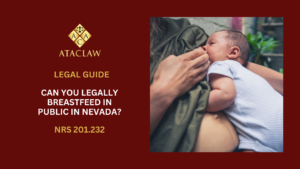Nevada law supports nursing mothers fully by allowing them to breastfeed their babies in any public or private location. This legislation ensures that mothers can provide for their children’s needs without worry of legal repercussions for indecent or obscene exposure. This legislation, deeply rooted in understanding and support, recognizes the fundamental act of breastfeeding as not only a natural but a necessary aspect of early child rearing. It safeguards the rights of nursing mothers to provide for their babies in both public and private settings without the cloud of legal repercussions, specifically around indecent exposure.
Furthermore, it mandates a progressive workplace culture where employers are obligated to accommodate the unique needs of nursing employees. This law stands as a testament to our community’s dedication to fostering environments that support the health, privacy, and bonding essential during the early stages of a child’s life.

Is Public Breastfeeding Allowed in Nevada?
Yes, in Nevada, mothers are legally entitled to breastfeed their infants in any public or private setting where they are allowed to be. This includes locations like shopping centers, dining establishments, retail shops, grocery stores, public transportation, hotel foyers, elevators, and office complexes—essentially, anywhere the public has access.
Nevada law supports breastfeeding openly, even if the act involves exposure of the nipple during or due to the feeding process. Importantly, the legality of breastfeeding remains intact regardless of any discomfort or offense it might cause to those nearby.
Starting from 2022, Nevada has set mandatory guidelines for courthouses to accommodate breastfeeding mothers. Courthouses must provide private lactation rooms for the public unless it proves impractical due to existing structural limitations or prohibitive construction costs. These lactation rooms should be distinct from bathrooms and equipped with essential amenities like a chair, a working surface, and an electrical outlet, ensuring privacy and comfort for nursing mothers.
Is Breastfeeding in Public Considered an Offense in Nevada?
No, you cannot be arrested for breastfeeding in public in Nevada. The state’s laws on nudity acknowledge the exposure of breasts, but explicitly clarify that breastfeeding does not constitute public indecency.
Understanding Decency Laws in Relation to Breastfeeding:
1. Indecent or Obscene Exposure:
Nevada’s statutes on indecent exposure (NRS 201.220) define it as any indecent or obscene display of a person’s genital area or buttocks. Common instances that fall under this category are actions by flashers or streakers. Importantly, the statute clearly exempts breastfeeding, stating that “the breastfeeding of a child by the mother does not constitute an act of open and indecent or obscene exposure of her body.”
2. Open or Gross Lewdness:
Similarly, the law on open or gross lewdness (NRS 201.210), which involves sexual acts performed where they can be viewed by the public, also specifically excludes breastfeeding activities. It asserts that “the breastfeeding of a child by the mother does not constitute an act of open or gross lewdness.”
These provisions ensure that nursing mothers in Nevada can breastfeed their children in public spaces without fear of legal repercussions for indecent exposure or lewdness. This legal protection promotes a supportive environment for breastfeeding, recognizing it as a necessary and natural act rather than an indecent one.
What Are the Regulations for Breast Milk Pumping at Work in Nevada?
Nevada upholds specific regulations to support nursing mothers in the workplace. Except for certain circumstances, state laws obligate both public and private employers to provide suitable rest times during the day for employees who are breastfeeding to express milk. These break periods should be made available for at least the first year following the birth of the child.
Additionally, employers are tasked with ensuring the availability of a sanitary space, separate from a bathroom, designated for the nursing employee to pump breast milk. This location should provide privacy and safeguard against disturbance from colleagues or the public.
However, if adhering to these requirements would result in undue hardship for the business, employers and employees are encouraged to collaborate on viable alternatives. Should mutual agreement on modifications not be achieved, the employer has the authority to propose what they regard as a reasonable substitute.
Non-compliance with these laws may result in criminal charges for employers, leading to consequences such as incarceration for up to half a year and/or fines reaching a thousand dollars. Moreover, employers may face civil fines of $5,000 per violation.
Understanding the Exceptions:
- Employers with fewer than 50 employees are exempt from these pumping regulations if compliance would cause substantial financial difficulty relative to the business’s size, resources, and structure.
- For employees at a construction site more than three miles away from the employer’s primary business establishment, contractors are not obligated to offer a specific pumping area aside from a bathroom.
- The Department of Corrections is also not required to facilitate pumping breaks or provide a secluded non-bathroom space for breast milk expression.
Are Pumping Breaks Considered Paid Time for Breastfeeding Mothers in Nevada?
In Nevada, employers are not mandated to pay breastfeeding mothers for the time spent on breaks for pumping breast milk, unless there is a specific stipulation within a collective bargaining agreement that outlines otherwise.
Is It Legal for Employers in Nevada to Fire or Demote Women for Pumping at Work?
In Nevada, it’s unlawful for employers to retaliate against employees for taking reasonable breaks to pump breast milk or for pursuing their rights to enforce pumping laws at work. If faced with such discrimination, employees can escalate the issue by filing a complaint with the Nevada Equal Rights Commission (NERC). Should resolution not be achieved through NERC, legal action in civil court may be a viable option.
For further legal assistance and to discuss your case with an expert, don’t hesitate to contact ATAC LAW.
